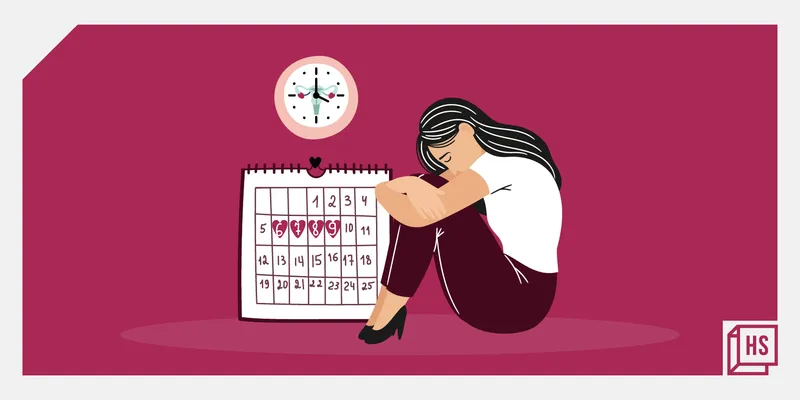How stigma related to weight gain is affecting women suffering from PCOS
According to healthcare experts, while weight gain doesn’t directly cause PCOS, it can exacerbate the symptoms and make the condition more challenging to manage.
Twenty-three-year-old Apeksha Priya, a project manager by profession, missed her period for the first time when she was in Class 11. When she met her gynaecologist, she was diagnosed with Polycystic Ovary Syndrome (PCOS). Priya recalls that all clinical sessions that followed the diagnosis were centered around her weight. The doctor then gave her a piece of paper bearing the names of birth control and ‘no junk food’ written on it.
“Back then I hardly had any idea about PCOS. I was just told to lose weight and everything would be fine,” she tells HerStory.
Following the diagnosis, Priya started various weight-loss diets, but things remained the same even after a year of treatment. “Losing weight was a huge problem even after regular exercise and dieting. I did not know how to manage my condition back then,” she recalls.
Her inability to lose weight also caught the attention of her family and she had to deal with body image issues. “I felt alone in the journey and it was overwhelming,” she explains.
Later, when she consulted another doctor, she felt that she was being heard properly and that not everything was about her weight. “I have begun my PCOS management journey. It is tough and slow, but I will get there,” she says.
Like Priya, many young girls and women in India and across the world are made to believe that excess weight is always the problem of the individual, and therefore it becomes their fault as it is assumed to be within their control.
Priyanka Shah was 20-years-old when she started having irregular periods. When she went to her doctor, she was also told to lose weight. Shah was also going through depression at the time and was not addressing her mental health. However, her doctor kept pushing her to lose weight and stop being lazy.
“Every time I went to my doctor, I used to hear that I need to lose weight and I should stop being lazy. She did not understand my mental health condition. Hearing complaints about your body weight and not being able to give your 100% in losing weight made me hopeless,” she says.
“Everything was just about weight,” she says. Shah later changed her doctor and now has been taking homoeopathic treatment.
PCOS has emerged as a significant health challenge affecting young girls and women across India. According to a study by Metropolis, one in five women in India are affected by PCOS, a condition characterised by hormonal imbalance, leading to difficulties in conceiving. The study also notes that women between the age group of 15 and 30 are at high risk of PCOS.
PCOS and weight bias
A study by the National Library of Medicine (NIH, 2020) notes that Obesity is a complex medical condition, influenced by several factors. Nevertheless, obesity bias in healthcare is a well-documented phenomenon, observed globally.
Another study published in the National Library of Medicine (2015) suggests that healthcare professionals report seeing people with obesity as lazy, weak-willed, or lacking self-control. A 2017 study in the same publication found that around 53% of women with obesity heard inappropriate comments about their weight from healthcare professionals.
Concerns about weight loss are also associated with delaying or avoiding preventive care.
This existing bias becomes even more complicated when it leads to health conditions such as PCOS, where weight loss is at the center of treatment.
Satakshi Chauhan was in class 6 when she got her first period. However, her cycles were never regular, and in class 12, she decided to go see a doctor.
“She told me that my condition was because of my weight and that is the only thing I need to focus on,” Chauhan says. She tried several diets such as intermittent fasting and the keto diet, which did not help her in losing weight and did not improve her condition.
She used to feel fatigued and had developed an unhealthy relationship with food. However, her doctor did not understand her mental state and just told her to lose weight.
“After every visit, I used to cry because I just felt helpless. With an emotional eating problem, I developed an unhealthy relationship with food. But nobody told me about how to manage both the conditions together,” she adds.
After years of study and changing three doctors, she has realised that PCOS management goes beyond losing weight.
“Exercise, a wholesome diet, a good sleep schedule, and taking less stress have helped me manage my condition,” she says.

PCOS has emerged as a significant health challenge affecting young girls and women across India
Dr Shweta Mendiratta, Senior Consultant, Dept of Obstetrics and Gynecology (Amrita Hospital, Faridabad), explains why weight loss is not a straightforward road in PCOS.
She explains that insulin resistance plays a significant role in PCOS-related weight gain. When the body stops responding well to insulin, the pancreas tries to compensate by producing extra insulin. This excess insulin can trigger the ovaries to produce more androgens, which can lead to weight gain, especially around the abdomen. This weight gain, in turn, can worsen insulin resistance, creating a vicious cycle. Moreover, high insulin levels can stimulate the production of fat cells and increase appetite, leading to overeating and weight gain. This is why many women with PCOS struggle with managing their weight.
She says that weight gain causing PCOS is a common misconception among people. “While weight gain and PCOS are interconnected, it's essential to recognise that weight gain doesn't directly cause PCOS. Rather, weight gain can exacerbate the symptoms and make the condition more challenging to manage,” she says.
“Research suggests that excess weight, particularly abdominal obesity, can contribute to insulin resistance, which is common in PCOS. Insulin resistance can worsen hormonal imbalances and lead to more severe PCOS symptoms. Additionally, losing weight in a healthy manner through diet, exercise, and lifestyle changes can significantly improve PCOS symptoms and restore hormonal balance,” says the expert.
Dr Mendiratta further adds that hormonal imbalances in PCOS can affect the way the body stores and utilises fat. Androgens can promote fat storage in the abdominal area, making it challenging to lose weight through conventional methods like diet and exercise. She emphasises the fact that accurate information and proactive healthcare are crucial in addressing PCOS effectively.
“While obesity is a common characteristic among PCOS patients, it's essential to recognise that not all individuals with PCOS are overweight. Understanding that PCOS affects both obese and non-obese individuals is crucial for accurate diagnosis and effective management,” she says.
Causes of PCOS are still unknown
PCOS is a hormonal disorder characterised by the ovaries producing elevated levels of androgens, which are male sex hormones. This can lead to the formation of multiple small cysts on the ovaries. While some women have these cysts, not all women with the condition necessarily develop them.
The most common symptoms comprise irregular periods, excess body hair, weight gain, acne, infertility, and dark patches on the skin. It can also lead to co-morbidities such as hypertension and type 2 diabetes. The disorder has both reproductive and metabolic health outcomes, and greatly impacts a person’s mental and emotional health.
Experts believe that the current treatment for PCOS is limited to the management of symptoms rather than treating the underlying cause. It has been widely observed that obesity aggravates adverse metabolic outcomes in patients with PCOS. Hence, healthcare professionals often recommend their patients to lose weight.
However, the weight loss journey for PCOS patients becomes overwhelming as the weight talk dominates all sessions. Research published in the National Library of Medicine states that “shaming individuals with obesity is not an effective tool to motivate them to lose weight because weight-based stigmatisation can hamper weight loss outcomes among adults in weight loss programmes.”
Multifaceted approach is the need of the hour
Dr Chennuru Nishitha, a Telangana-based gynaecologist, explains why doctors lay emphasis on weight loss for a PCOS patient.
She says, “As doctors, what we have observed is that obesity worsens the symptoms. We might not completely know what is causing the condition, but through our observation, we know what is aggravating it. Our emphasis on weight reduction is coming from the same concern.”
However, Dr Mendiratta also believes the issue of weight management in PCOS patients can be complex and is influenced by various factors.
“While it is essential to recognise that motivation can play a role in any health-related endeavour, it's not the sole determinant of weight loss success for individuals with PCOS. PCOS is a hormonal disorder that can lead to weight gain due to insulin resistance, hormonal imbalances, and other metabolic factors. These physiological aspects can make it particularly challenging for individuals with PCOS to lose weight. Despite their best efforts and motivation, they may find it difficult to shed excess pounds,” says the expert.

Weight management in PCOS patients can be complex and is influenced by various factors.
As such, she says that a multifaceted and comprehensive approach is the need of the hour to treat PCOS in a holistic way.
“The idea is to look at the patient, individually. Every patient is different. Weight loss delays could stem from factors like hypothyroidism, Inflammatory Bowel Disease, or Vitamin D deficiency, not just lack of adherence. Consideration of individual histories, like eating disorders, is vital,” says Dr Nishitha.
She believes that since there is a certain lifestyle and diet that has to be inculcated, the patient needs to be in touch with a nutritionist who might guide them in the weight reduction process.
“PCOS also comes with other symptoms that might fall out of the scope of a gynaecologist for which there are specialised experts,” she adds.
On the same lines, Dr Mendiratta says that empathy and understanding are crucial in supporting these patients, as frustration with the lack of progress can sometimes lead to a sense of demotivation.
“It is essential to avoid placing the entire blame on motivation, recognising the unique challenges PCOS presents in the journey toward weight loss,” she adds.
Edited by Megha Reddy







